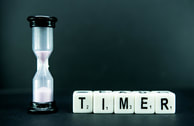|
I spent New Year's Eve with some of my friends - we do roughly the same thing every year, which provides a bit of comfort and ritual to end the year on. Whichever city we're in (everyone lives somewhere different) it always involves a nice bar, some good food, then a long walk back to someone's home for dessert and singing along badly to Auld Lang Syne at midnight! It's calming and I love it. There was a lot of conversation about resolutions and what people wanted to do differently this year, and much of it seemed to centre on spending their time in a different way. The conversation inspired me to think more deeply about how I spend my time - in this post, I'll give you some tips on how I'm (hopefully) going to procrastinate less and be more intentional in 2019!  Focus on what's important to you There were so many different ideas and resolutions flying round on Dec 31st! Some of my friends want to give blood more often, some want to be kinder to themselves, some just want to carve out a bit of time for themselves each day. For me, I'm okay with most of those things but I'm planning to focus on three things that fell by the wayside at the end of 2018 - my physical health, eating foods that nourish me, and listening to more podcasts (recommendations welcome!) She's making a list... I love a good list! I realised a long time ago that if I don't have a list at work (I use the "sticky notes" function on the computer) then I'm likely to forget things, which just isn't an option in my line of work. My list at work has five projects on it that are rolling, and have been for the last 12 months, just so I keep them in mind. It also has more time-specific items, like finishing notes and dictating letters, which I try to check off before I leave the office every day. I won't lie, part of the appeal of a list for me is ticking things off it, and having the sense of getting things done. My list at home looks a little different, and is a daily list based on the things I'm prioritising this year. It includes things like "run 5k," "make your bed" and "write blog post on x" - again, I find checking things off quite motivating, but if that's not for you then putting everything on there is likely to be more demoralising. I check it off each day, making sure there isn't too much on it - no more than five things or I'm likely to get overwhelmed and not do anything! Multitask! One of my friends always seems to have his finger on the pulse - if you're talking about a new TV show, or a new song, he's already seen it/heard it. He also manages to keep to a serious gym regime (he's a marathoner) and regularly spends 12hrs at the office. How does he manage it?! He multitasks! I'm not saying you can do this with everything - watching TV whilst driving isn't recommended! - but this is about being more intentional with your time. Rather than going for a run and listening to the same old music, stick a new playlist on or a podcast. Watch a film or read a book if you're in a waiting room. The possibilities for mixing media are endless, and link to the next item on my list. Ditch the phone (if you want to) This can be a controversial one, and I don't mean ditching the phone out of hand completely. Online social networks are an incredible resource; I've made some awesome friends online and I wouldn't be without them. But if you find yourself aimlessly flicking from Facebook to Twitter to Pinterest to Instagram without thinking about it, like one of my friends said she does, then you might want to have a set time for putting the phone down, or not checking it unless you have a notification and then limiting your browsing time to five minutes. My friend plans to learn a new language and take up crafting in her spare time, and I'm sure she'll manage it. Factor in down time Again, we all start the year with the best of intentions, but those intentions can easily become overwhelming. My last blog post discussed some of the reasons that resolutions can fail, but it's also important to factor in "down time" away from planning and doing, so that you don't get too overwhelmed by the things you want to do. If that happens, you might end up using the whole day (or week, or month...!) as downtime, which isn't going to be good for your plans in the long-term, or your time management in general.  Make yourself accountable This can be an important one. For me, it's posting on the #CookJan hashtag on Twitter (a great way to reinvent your cooking), talking every day to a group of runners I know and posting my mileage, and telling my friends which podcasts I'm listening to - they like to talk to me about the latest episode, and it I haven't heard it then I'm not going to be able to join in. Whatever it is you want to use your time for, make sure you can hold yourself accountable for it. And that's it! What are your favourite anti-procrastination tips? Let me know in the comments.
0 Comments
Leave a Reply. |
AuthorDr Sarah Blackshaw: Clinical Psychologist, blogger, tea drinker, interested in dinosaurs and shiny objects Archives
January 2024
Categories
All
|
Photos from wuestenigel (CC BY 2.0), Ivan Radic (CC BY 2.0), Marco Verch (CC BY 2.0), John Brighenti, wuestenigel, simplicityhunter, Anarchimedia, Find Rehab Centers, wuestenigel, Ivan Radic, Army Medicine, kennethkonica, smallcurio, Jasmic, wuestenigel, JoanDragonfly, BrightStarPhoto21, popofatticus, wuestenigel, forthwithlife, kurotango Clip, ⍘dotism⍘, Tambako the Jaguar, One Click Group UK, Rawpixel Ltd, Blue Mountains Library, wuestenigel, mattbuck4950, h.koppdelaney, verchmarco, The Mom With a Camera, cloudplanner, wuestenigel, verchmarco, OIST (Okinawa Institute of Science and Technology), stevendepolo, juliejordanscott
 RSS Feed
RSS Feed